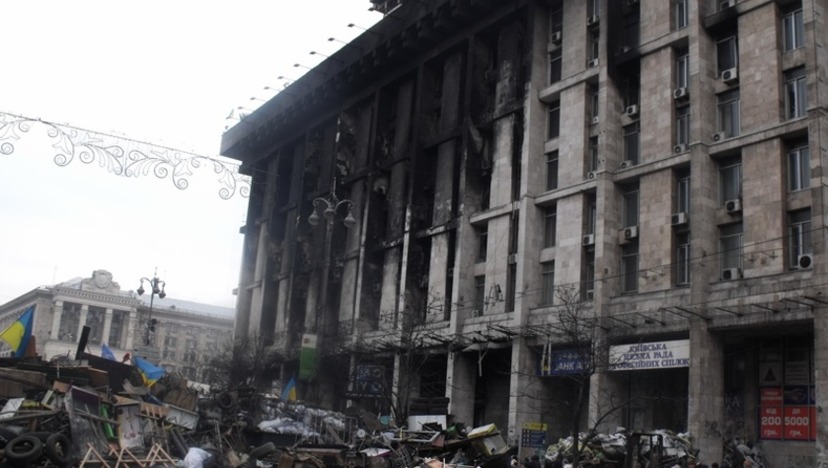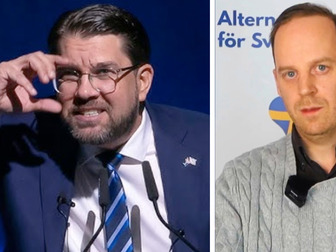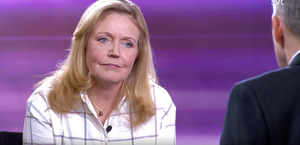At the end of February, mere days after Ukraine's president, Viktor Yanukovych, was overthrown, Mikael Skillt boarded a plane bound for Kiev. He left behind a relationship that had just ended, a terrace house in a Stockholm suburb and a well-paid job as a planner at a construction company.
The purpose of his trip was to volunteer for one of the nationalist organizations which, as a result of their central role in the Ukrainian revolution, have gone from being relatively marginal to controlling the streets of Kiev.
"It was not an easy decision to make," Skillt said when Fria Tider spoke to him over Skype. His former employer, also a personal friend, was not happy when Skillt suddenly quit his job to go to Ukraine. Skillt said he went anyway because of a sense of solidarity with the Ukrainian nationalists. "Nationalists have died on the streets of Kiev," he recounted. "And I was able to help them. That is more important than my personal well-being."
Skillt is 37 years old and has been involved in various Swedish nationalist groups for more than a decade. Between 2002 and 2010 he was active in the National Socialist organization Svenska motståndsrörelsen (Swedish Resistance Movement). Today, he is a member of a small, nationalist political party, Svenskarnas parti (Party of the Swedes), but holds no official position within it. He says he is no longer a National Socialist and describes himself as an ethnic nationalist. "You are born Swedish," he explained. "It's not something you can become."
After arriving in Ukraine, Skillt joined the organization C14, also known as Sich, which is closely affiliated with the nationalist party Svoboda. In an interview with the BBC, C14's leader, Yevhen Karas, says that his organization has approximately 200 members and that its main objective is to sever all ties between Ukraine and Russia. Some have called him a Nazi, but he firmly denies that accusation. "I don't think I'm a Nazi, I'm a Ukrainian nationalist," Karas told the BBC. "The main confrontation is about that some ethnic groups have control of many business structures, some economical and political forces."
When asked which ethnic groups he was referring to, Karas clarified, "Russians and Jews. Some non-Ukrainian groups control a huge percent of the economic and political power. And of course, in this situation you have some tension with the Ukrainian people."
According to Skillt, C14 has been in existence for quite some time. Prior to the revolution, C14 often intervened to protect tenants threatened by illegal eviction. Ukrainian landlords, similar to so-called slum lords in America, have often evicted tenants illegally in order to tear down an existing building and put up something newer and more profitable in its place. They often do that by bribing corrupt politicians. In many cases, C14 has occupied such buildings and chased away the police when they arrive to evict the tenants.
When the protests against Yanukovych's government began last autumn, C14 was one of the groups that fought the riot police, Berkut, as they tried to drive the protesters off the Maidan Square. "Most of the members of C14 have been very active in the Maidan riots. If you sit down and talk to these guys, I can give you ten names right off the bat of people who have lost a friend in the fighting. So, they've been on the front lines," Skillt said. "I have never heard anyone here call himself a National Socialist. They fight for a Ukraine based on ethnic unity."
Paramilitary Right fills power vacuum
Today, C14 is a force to be reckoned with. Together with the so-called Right Sector, C14 patrols the streets of Kiev, fights crime and guards public buildings. Skillt and several other Swedish volunteers participate in the patrols. "The police force still exists, but isnt seen much," he said. "Most of the police officers you see on the streets are only traffic police. Maintaining order is primarily being done by C14 and the Right Sector."
The reason why there is a power vacuum that is currently being filled by these groups is that the special police force, Berkut, was disbanded following the overthrow of Yanukovych, and many officers of the regular police force were also sacked. "Corruption among the police has been massive and many have been dismissed," Skillt explained. "Some have fled for their lives because they were guilty of corruption, or otherwise behaved like bastards. The officers that remain are pro-Ukrainian and not corrupt. But because of their low-life former comrades, people don't have much confidence in them either."
"Berkut was really disgusting," he continued. "I have met some people who were arrested by them. They were tortured, sometimes even maimed. People had toes and fingers cut off. Some were doused in gasoline, while police officers stood next to them, smoking. Others had water poured over them and were then thrown out into -10 degrees C temperatures."
"The nationalist groups, rather than the police, enjoy a great deal of confidence among the public," Skillt told us. "They have acted in an exemplary manner, as far as the people are concerned. They have stood up to armed police officers, in many cases while unarmed, and at great risk to their own lives. This won the confidence of the people."
When the Ukrainian parliament convened on March 17 to discuss the situation in Crimea, C14 and the Right Sector provided security. Skillt was part of the group that C14 sent to guard the parliament. A photo showed him wearing a uniform, a bulletproof vest, a ski mask and sunglasses. He carried a gun case on his back, but did not want to tell us what it contained. "A fishing pole," he said.
Other photographs from the parliament, however, show uniformed, masked men openly carrying automatic rifles. Skillt confirms that both C14 and the Right Sector possess firearms, even though guns are not part of their standard equipment. "The ability to handle guns safely varies widely from person to person. Some of the guys in the Right Sector are like monkeys with guns," he said. "You put your life at risk just by being near them, when theyre armed. It's pure slapstick, they have guns but handle them carelessly, as if they were wooden sticks. In C14, safety routines are much better. It's almost up to the standard of the Swedish military."
Skillt described C14 as a more professional and disciplined unit than the Right Sector. Before Skillt was approved for service in C14 his physical fitness and marksmanship were tested. Candidates are expected to be able to run five kilometers in under 25 minutes while wearing a full uniform, a bulletproof vest and carrying other personal equipment. "It's not as easy as it sounds," Skillt said. "Part of the course is a steep uphill slope. I made it in 24 minutes and a few seconds."
The Right Sector was formed last autumn, when the protests began. It first functioned as an umbrella organization for various nationalist groups that wanted to stop the police from driving the protesters from their encampments on the Maidan in central Kiev. Its members range from soldiers with combat experience from Afghanistan and Chechnya, to students and soccer hooligans.
According to Skillt, the different groups within the Right Sector have now coalesced into one organization with a common leadership. Its leader, Dmytro Yarosh, has announced his candidacy in the upcoming presidential election in May. He opposes integration with the European Union, which he has described as a monster that imposes anti-Christian and anti-national laws upon its members. In a widely-distributed promotional video, the Right Sector has claimed to fight against totalitarian liberalism and for the rebirth of Europe.
One incident from last week illustrates the influence of these paramilitary, Right-wing groups in post-revolutionary Ukraine. Skillt told us that he was one of approximately 20 activists from C14 who went to the office of the Ukrainian prison authorities in Kiev. The purpose of the visit was to secure the release of one of the organization's members, who had been jailed for participating in the street-fighting with the police while Yanukovych was still in power.
"There were four guards there," Skillt said. "They locked themselves in a sentry booth as soon as we got there. We told the head of the prison authority that if he wouldnt come outside and talk to us, we would come inside and talk to him." He actually did come outside and, after a brief discussion, promised the C14 activists that he would do what was necessary to have their comrade released.
Russian infiltrators
Outside of Kiev, Skillt has visited a number of cities in the Russian-influenced eastern regions of Ukraine, mainly Kharkov, Odessa and Donetsk. "The mood there is not very good," Skillt said. "People have been killed in several places. In Kharkov, the Right Sector has opened fire. A close friend of many C14 members was recently stabbed to death in Donetsk."
In early March, pro-Russian protesters stormed a government building and detained thirty Right Sector activists who had occupied it. "Since then the control of that building, and several other such buildings in eastern Ukraine, has repeatedly changed hands between the Right Sector and pro-Russian activists," Skillt told us. "Right now I think pro-Ukrainian forces are in control of those buildings, but that could change quickly."
According to Skillt, activists bussed in from Russia have contributed to the stoking of pro-Russian sentiment in eastern Ukraine. He says he was present when a Russian soldier was arrested and questioned by a pro-Ukrainian paramilitary group in Kharkov last week. "A busload of pro-Russian activists had just arrived," he said. "A confrontation ensued and one of the gentlemen from the bus was detained and questioned. It turned out he was a Russian soldier on leave. He had been paid to go to Kharkov and start trouble. He wasn't paid by the Russian government, but by private groups in Russia who have an interest in Ukraine. They arrange bus trips to eastern Ukraine."
"That doesn't mean that there are no ordinary people and local activist groups there who are pro-Russian," he continued. "There are. But many of those who are very extreme and also skilled in militant activism are Russians."
Skillt has also spent time in western Ukraine, which is mainly populated by ethnic Ukrainians. The population there is generally more oriented towards Europe and the West than the people in the eastern regions. "In the west, the situation is very calm," Skillt explained. He said that the police are still in charge of maintaining order there, and have not been replaced by paramilitaries as in Kiev.
Sniper duels on the Maidan
When Fria Tider asked Skillt about rumors that the Ukrainian opposition itself may have been behind the shootings of protestors on the Maidan, he said that he is aware of them, but puts no stock in them. However, he said he has spoken to two people who sniped at the police on the Maidan Square during the riots. "They used Saiga semi-automatic rifles equipped with telescopic sights, and were positioned on the third floor of the Trade Unions Building on Maidan Square," Skillt said. "Their mission was to take out Berkut's snipers," he added.
He also told us that he recently ran into a man in an American uniform, carrying an American-made rifle. "It was a bit odd, but it turned out he was Ukrainian," Skillt said. "He had a modified, short-barrel M-16 with a telescopic sight. We said a quick hello."
Volunteer in the army
One of the projects Skillt is working on is to create an international center where nationalists from other countries can go and get to know like-minded Ukrainians. "It's mainly a question of networking and exchanging experiences concerning how to do practical politics. They could come and get an understanding of what has happened here and what is happening in other countries. The center will be located on C14's premises, but other groups are also involved. Svoboda will probably have a hand in it."
Skillt said he has no plans to return to Sweden anytime soon. He has registered as a volunteer with the Ukrainian army, and has been posted as an infantryman. If war breaks out, he expects to be called up for service. He has not yet received any formal military training in Ukraine. His previous military experience consists of seven and a half months of compulsory military service in the Swedish Army and six years as a marksman in the Swedish National Guard.
"In five years you will address me as colonel," he wrote over Twitter when asked what he will be doing five years from now, adding a smile emoticon. "No, really, I have no idea. I hope to commute between Sweden and Ukraine."





